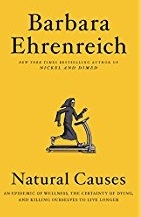Title: Natural Causes: An Epidemic of Wellness, the Certainty of Dying, and Killing Ourselves to Live Longer
Author: Barbara Ehrenreich
Genre: Nonfiction
Trigger Warnings: Death, medical content, medical trauma (mentions), sexual assault (mentions)
Back Cover:
A razor-sharp polemic which offers an entirely new understanding of our bodies, ourselves, and our place in the universe, Natural Causes describes how we over-prepare and worry way too much about what is inevitable. One by one, Ehrenreich topples the shibboleths that guide our attempts to live a long, healthy life — from the importance of preventive medical screenings to the concepts of wellness and mindfulness, from dietary fads to fitness culture.
But Natural Causes goes deeper — into the fundamental unreliability of our bodies and even our “mind-bodies,” to use the fashionable term. Starting with the mysterious and seldom-acknowledged tendency of our own immune cells to promote deadly cancers, Ehrenreich looks into the cellular basis of aging, and shows how little control we actually have over it. We tend to believe we have agency over our bodies, our minds, and even over the manner of our deaths. But the latest science shows that the microscopic subunits of our bodies make their own “decisions,” and not always in our favor.
We may buy expensive anti-aging products or cosmetic surgery, get preventive screenings and eat more kale, or throw ourselves into meditation and spirituality. But all these things offer only the illusion of control. How to live well, even joyously, while accepting our mortality — that is the vitally important philosophical challenge of this book.
Drawing on varied sources, from personal experience and sociological trends to pop culture and current scientific literature, Natural Causes examines the ways in which we obsess over death, our bodies, and our health. Both funny and caustic, Ehrenreich then tackles the seemingly unsolvable problem of how we might better prepare ourselves for the end — while still reveling in the lives that remain to us.
Review:
This book is somewhat meandering and surprisingly sad.
After how great Barbara Ehrenreich’s Bright-Sided was, I put more of her books on my to-read list and even bought a copy of her book Nickel and Dimed (though I have yet to read it). This is one of her newer ones, but it was available as an audiobook at my library so I grabbed it.
This book was published in 2018. Barbara is turning 80 this year, so she would have turned 77 in August of 2018. This book starts talking about her realization that she was “old enough to die” – that she was at an age where nobody would question if her obituary said she died of “natural causes.” Then she discussed how she declined preventative care that wouldn’t do much at her age, and how the medical establishment pushed preventative care even when it wasn’t helpful or was actually harmful.
There was a little weirdness early on, but not so much that I couldn’t overlook it. Barbara’s refusal of most preventative care is apparently not something she started in her old age but has always been something she’s done, and there were several odd comparisons of routine medical procedures to sexual assult (to be fair, the medical establishment back in the 1950s and 1960s was definitely worse to women than it is today, but she either doesn’t talk about how things have changed or just hasn’t been to a doctor since the 1960s and I’m not sure which).
And then it kinda went off the deep end. Only the first chapter or two were actually about the medical establishment and the excessive medicalization of modern society, which is what I actually thought this book would be about. (Guess I should have read the back cover more thoroughly.) It goes in depth about how our immune system may actually hasten our deaths in some situations, touches on the human ego and our inability to imagine a world without ourselves after our death, and how we think about things as “alive,” and ends with a conclusion about how even after you die it’s okay because the universe is full of life in ways we don’t think about. It seems like Barbara started out to write a book about the excessive medicalization of society (which is very much in line with her previous body of work) and then lost track of the original point as she was forced to confront her own mortality and used this manuscript to work through it.
I didn’t really learn anything from this book like I’d hoped, and I mostly just ended up feeling sad for her. It felt like I’d just watched a woman who is “old enough to die” and terrified of it grapple with the fact that she is definitely going to die and it’s probably going to be soon and come to the conclusion that it’s all okay because life is everywhere even when we don’t think of it as life 🙂 🙂 🙂
I don’t like categorizing books as just “Nonfiction,” but I can’t think of anything better. It starts out trying to be a work of science and sociology, and then it takes a dive into memoir with a vague metaphysics feel but shoved into a science and sociology framework. It’s too sciency to be a memoir but too much about the author wrestling with her own mortality to be purely science. Viewed in the context of the last half of the book, one gets the feeling that her avoidance of preventative care she talks about at the beginning has less to do with her hatred of the medicalization of society and more to do with not wanting to know if death is coming for her.
In the end, I came away from this book with only feelings of sadness for the author. I hope she comes to grips with her own mortality eventually and finds comfort from whatever method she takes.

